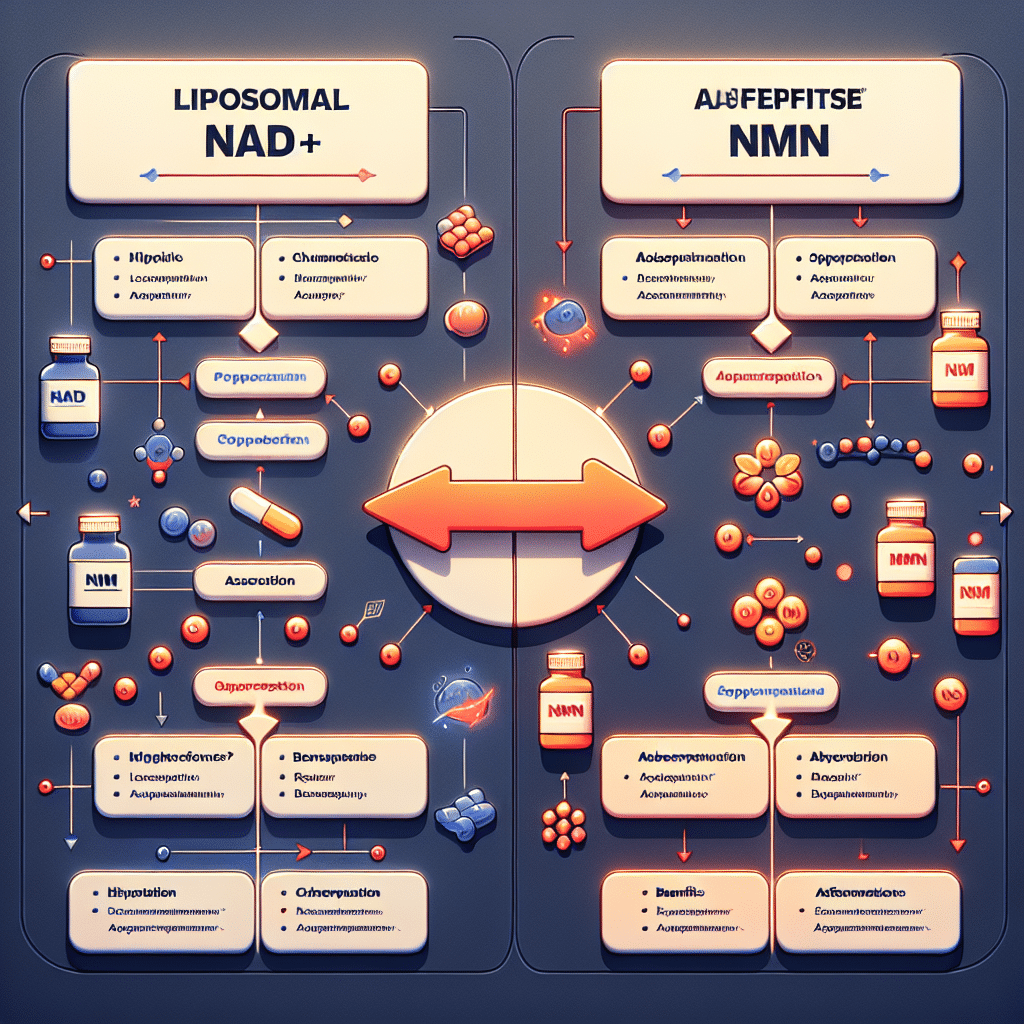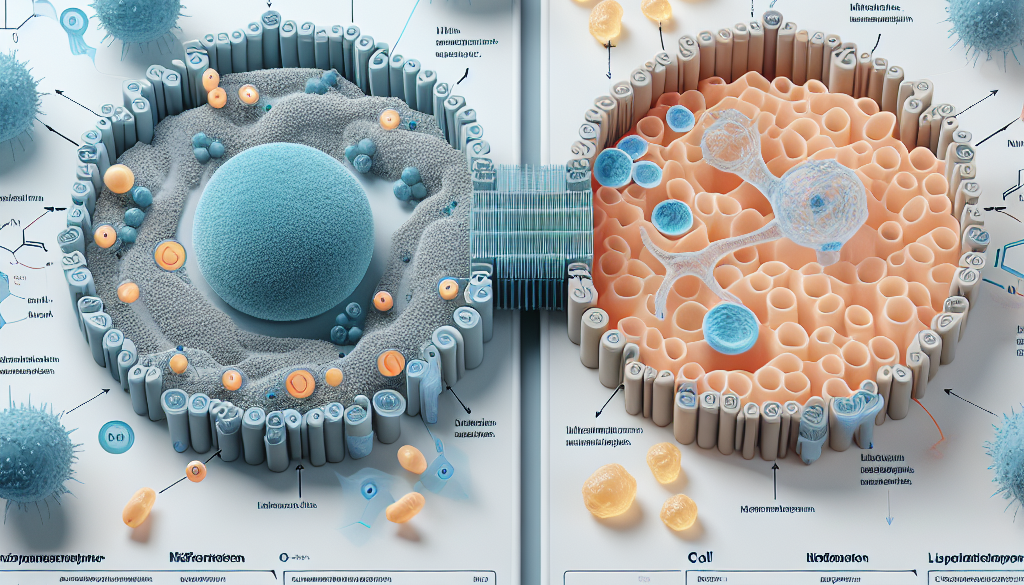Liposomal NAD+ vs NMN: Key Differences Explained
-
Table of Contents
- Liposomal NAD+ vs NMN: Understanding the Key Differences
- What is NAD+ and Why is it Important?
- Understanding NMN and Its Role in NAD+ Synthesis
- Liposomal Delivery Systems: Enhancing Bioavailability
- Liposomal NAD+ vs NMN: The Differences
- Comparing the Benefits of Liposomal NAD+ and NMN
- Scientific Research and Case Studies
- Choosing Between Liposomal NAD+ and NMN
- Conclusion: Key Takeaways on Liposomal NAD+ vs NMN
- Explore ETchem’s Protein Products
Liposomal NAD+ vs NMN: Understanding the Key Differences

As the quest for longevity and optimal health continues, the scientific community has turned its focus to molecules that play critical roles in cellular health and metabolism. Among these, Nicotinamide Adenine Dinucleotide (NAD+) and its precursor, Nicotinamide Mononucleotide (NMN), have garnered significant attention. With the advent of liposomal technology, the bioavailability of these molecules has been enhanced, leading to a debate on the efficacy of Liposomal NAD+ versus NMN supplementation. This article delves into the key differences between these two compounds, their benefits, and how they work within the body.
What is NAD+ and Why is it Important?
NAD+ is a coenzyme found in all living cells that is essential for energy production and regulating cellular processes. It plays a pivotal role in metabolism, helping to convert nutrients into energy and acting as a helper molecule for proteins that regulate other cellular functions. As we age, NAD+ levels decline, which is thought to be linked to age-related diseases and the overall aging process.
Understanding NMN and Its Role in NAD+ Synthesis
Nicotinamide Mononucleotide (NMN) is a compound that naturally occurs in the body and is a direct precursor to NAD+. NMN supplementation has been studied for its potential to boost NAD+ levels, thereby supporting energy production, DNA repair, and possibly extending lifespan.
Liposomal Delivery Systems: Enhancing Bioavailability
Liposomal delivery systems encapsulate active compounds like NAD+ and NMN within liposomes—tiny, spherical vesicles made from cholesterol and naturally occurring phospholipids. This encapsulation protects the compound from degradation in the digestive system and enhances its absorption into the bloodstream, potentially increasing its efficacy.
Liposomal NAD+ vs NMN: The Differences
While both Liposomal NAD+ and NMN aim to increase NAD+ levels in the body, they differ in their structure, mode of action, and how they are processed by the body.
- Structural Differences: NAD+ is a larger molecule that requires direct uptake into cells, while NMN is smaller and must be converted into NAD+ within the cell.
- Mode of Action: Liposomal NAD+ delivers NAD+ directly to the bloodstream, whereas NMN must first be converted by the body into NAD+.
- Cellular Uptake: Some studies suggest that NMN is more readily taken up by cells due to its smaller size, whereas liposomal NAD+ may have a more immediate impact on raising blood NAD+ levels.
Comparing the Benefits of Liposomal NAD+ and NMN
Both Liposomal NAD+ and NMN offer potential benefits, but their effectiveness may vary based on individual health status and goals.
- Anti-Aging: By increasing NAD+ levels, both compounds may help mitigate some effects of aging at the cellular level.
- Energy Metabolism: Enhanced NAD+ levels support the body’s energy metabolism, potentially improving physical performance and recovery.
- Neuroprotection: NAD+ is crucial for brain health, and both supplements may offer neuroprotective benefits.
- Cardiovascular Health: NAD+ helps maintain healthy heart function, and both forms of supplementation could support cardiovascular health.
Scientific Research and Case Studies
Research on NAD+ and NMN is ongoing, with several studies highlighting their potential benefits. For instance, a study published in Cell Metabolism found that NMN supplementation improved metabolic function and had anti-aging effects in mice. Human studies are more limited but suggest that NMN can increase NAD+ levels in the blood.
Case studies on liposomal NAD+ are less common, but anecdotal evidence suggests that users experience increased energy levels and improved cognitive function. More research is needed to fully understand the long-term effects and optimal dosages of both supplements.
Choosing Between Liposomal NAD+ and NMN
When deciding between Liposomal NAD+ and NMN, consider factors such as personal health goals, the potential rate of absorption, and scientific evidence. Consulting with a healthcare professional can also provide guidance tailored to individual needs.
Conclusion: Key Takeaways on Liposomal NAD+ vs NMN
In summary, both Liposomal NAD+ and NMN offer promising routes to enhance NAD+ levels and support overall health. The key differences lie in their absorption, conversion process, and how they are utilized by the body. As research evolves, these supplements may become integral components of health optimization strategies.
Explore ETchem’s Protein Products
For those interested in further supporting their health, ETchem’s protein products offer high-quality options. Their range of collagen products, including marine, fish, bovine, and chicken collagen, provide the building blocks for healthy skin, joints, and tissues. ETchem’s commitment to quality and customer satisfaction makes them a top choice for protein supplementation needs.
About ETChem:
ETChem, a reputable Chinese Collagen factory manufacturer and supplier, is renowned for producing, stocking, exporting, and delivering the highest quality collagens. They include marine collagen, fish collagen, bovine collagen, chicken collagen, type I collagen, type II collagen and type III collagen etc. Their offerings, characterized by a neutral taste, instant solubility attributes, cater to a diverse range of industries. They serve nutraceutical, pharmaceutical, cosmeceutical, veterinary, as well as food and beverage finished product distributors, traders, and manufacturers across Europe, USA, Canada, Australia, Thailand, Japan, Korea, Brazil, and Chile, among others.
ETChem specialization includes exporting and delivering tailor-made collagen powder and finished collagen nutritional supplements. Their extensive product range covers sectors like Food and Beverage, Sports Nutrition, Weight Management, Dietary Supplements, Health and Wellness Products, ensuring comprehensive solutions to meet all your protein needs.
As a trusted company by leading global food and beverage brands and Fortune 500 companies, ETChem reinforces China’s reputation in the global arena. For more information or to sample their products, please contact them and email karen(at)et-chem.com today.




